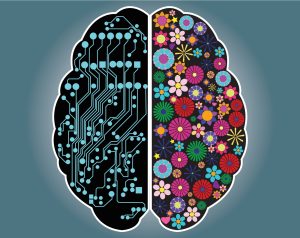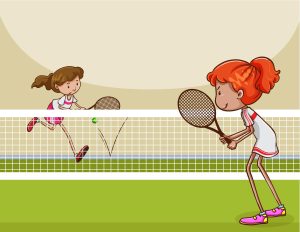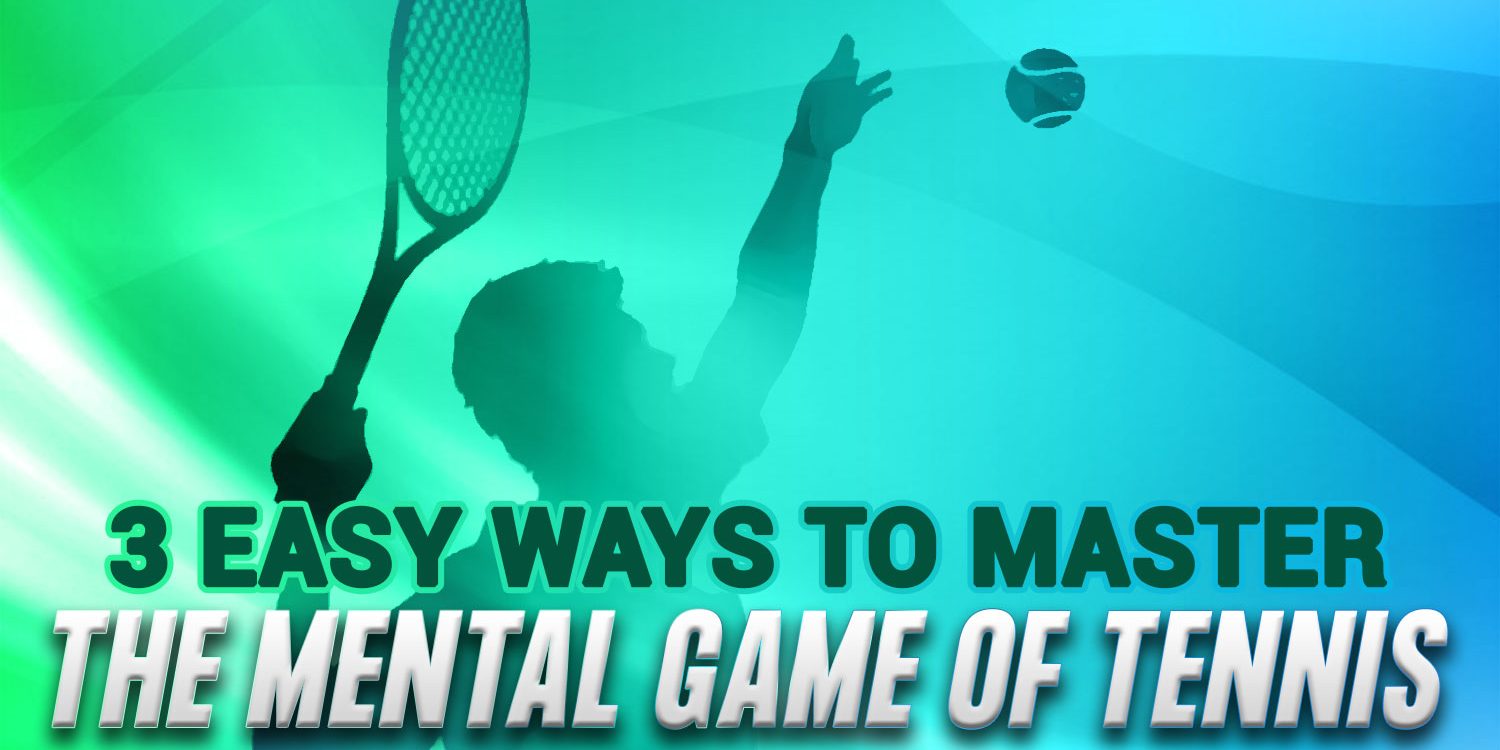Your degree of mental toughness has a much greater impact on the results of your tennis game than you might think.
Nutrition, physical fitness, and the fundamentals are certainly critical to winning at tennis, but there’s a missing piece.
That missing piece is mastering the mental game of tennis.
In this article, you will learn what a weak mental tennis game looks like and strategies on how to make your mind your #1 strength!
The Mental Game of Tennis
Experts in tennis believe the mental game accounts for between 45%-75% of the results top tennis athletes achieve.
Tara Lapinski, a former Olympian, recently stated competing at the top level of the Olympics is 90% mental!
“Surprisingly, most tennis players put little to no effort into building their mental skills.”
Players such as Mardy Fish, Serena Williams, and Naomi Osaka have all struggled with the mental side of tennis.

No one is free from being challenged by the mental side of life and of tennis.
Top players, as well as players just starting out, are human and experience the same set of mental challenges.
If you’re serious about tennis, maybe it’s time to get serious about your mindset?
Mindset Habits That Kill Your Tennis Game
How do you know if your mental game is off?
Let’s talk about some habitual patterns seen in players who aren’t playing to their potential.
Here’s a list of mindset habits that have a negative impact on your tennis game.
Have you struggled with any of these before?
- Overthinking a match.
- Not playing as you practice.
- Beating yourself up.
- Poor emotional control.
- Fear of making mistakes and failing.
- Struggle to let go of previous points.
- Not trusting yourself enough.
- Feeling overwhelmed.
- Stress and anxiety before a match.
- Focusing on others too much.
- Fear of other people’s opinions on your play.
- Losing focus or desire mid-match.
- Defeated body language.
- Tennis begins to not be fun anymore.
The last one hurts me the most.
“To have a passion for years and to give It up because of something that is easily overcome with the right process is just not acceptable to me.”
The stigma around mental health, in general, has always been what holds people back most.

Many people think it means something is wrong with them or they are broken which is 110% NOT TRUE!
I get so angry and upset by this stigma because it holds tens of thousands of players back from enjoying and playing their best.
Deep breath…lol
The mental game is a part of all sports and especially a sport like tennis where all the pressure, results, and success lie on your own shoulders.
Denying that the above issues will not improve your tennis game.
There needs to be a balance between your technique, your nutrition, your fitness, and the mental game of tennis.
“You should be placing at least 20% of your training efforts on training your mind.” Dr. Jay Cavanaugh, RAK Tennis.
Let’s look into what that 20% can start to look like so you can start taking action.
Improving your tennis’ mental game starts now.
Mindfulness, Meditation, and Mantras
The three popular M’s of the mental game of tennis are mindfulness, meditation, and mantras.
Each is an opportunity for you to master a skill that in the heat of competition lies in your back pocket waiting for you to call it to action.
Mindfulness
Mindfulness or self-awareness is the number one skill you must master in order to create change in your mindset.
“There’s no way to improve your mindset if you’re not aware of what’s going on in your mind.”
Think of mindfulness as recognizing where your thoughts, feelings, and actions go at any time throughout the day.
For example, if right now I were to ask you, “What’s your vibe?”, would you be able to describe your emotional state easily and accurately?
If I were to ask you prior to this article, what you were thinking about, could you answer that question as well?

Don’t worry, the average person would struggle to answer this question however, this reveals an amazing opportunity for you to improve your life and your match play.
Mindfulness and self-awareness dance together and are step one in recognizing where you place your energy focus and attention so you can start shifting it in a direction that better serves you.
Meditation
We’ve all heard of meditation however few people discuss the specifics of how it can benefit the performance of tennis athletes.
A quiet mind is a precursor to entering into a flow state where time slows down and we trust in our abilities and our self.
Modern-day minds tend to overthink and are hungry for excessive stimulation.

Developing a daily meditation practice trains your brain to stop thinking and start freeing your mind.
“One of the biggest barriers to starting meditation is actually overthinking it ironically enough.”
A meditation practice can start by simply observing a set of clouds passing or by observing tree branches moving in the wind.
The key is to focus your energy and attention on something while free of thought and judgment.
It’s the art of not thinking, labeling, or judging.
It’s simply observing.
This is one skill you must develop in order to master the mental game of tennis.
Make meditation a daily practice and you will find yourself entering a flow state more often and getting less distracted during match play.
Don’t overthink meditation.
Mantras
Think of mantras as statements you make to yourself that remind you of what’s truly important.
They also reinforce beliefs that you have or are building up.
Here are a few examples of mantras:
- “No matter what, I never give up.”
- “Every single point is a new opportunity.”
- “I’m not afraid to lose.”
- “I learn and grow from every mistake I make.”
- “I am strong, I am driven, and I am focused.”
- “Never satisfied but always gratified.”
- “It’s not a big match, it’s just a small moment.”
What makes mantras powerful is the fact that they guide our focus and attention to thoughts that can serve us as opposed to letting our minds wander.
Letting your mind wander often results in negative self-talk or thoughts that do not serve us.

Mantras remove that risk by injecting a powerful statement that provokes emotion in elicits positive vibes.
In between points where do you allow your mind to wander?
Imagine how powerful it would be to guide your thoughts, feelings, and resulting actions by being intentional with where you direct your focus and attention.
Tennis Mental Skills Training Requires Repetition
Your mental fitness, like your physical fitness, is more of a process than it is an outcome.
The biggest mistake made in the world of sports psychology and training your mind is thinking that hearing something once is enough to create a behavior change.
This couldn’t be any further from the truth.
In order to change your habits of thought that have been developed over 15, 30, or 40 plus years, you’ve got to focus on repeating these new patterns until they become automated.
“Research shows that some habits take anywhere from 30 to 90 days to change.”
The more ingrained the behavior and the stronger the rewards and triggers, the longer it will take to create a change in that behavior.

Breaking habits can be more challenging than building new ones so we often shift our focus to building better habits.
These better habits can take over the bad ones and can include:
- Daily meditation.
- Building self-awareness.
- Developing the ability to focus.
- Becoming more confident.
- Morning and evening routines.
- Responding instead of reacting.
- Letting go from emotional attachments.
- Positive self-talk.
- Feeling gratitude daily.
- Gaining clarity on goals.
- Setting feeling-based intentions.
- Building the ability to accept reality as it happens.
- Looking at mistakes as opportunities.
- Becoming more present during match play.
- Experiencing pain but avoidance of suffering.
- Embracing and enjoying adversity.
- Making the uncomfortable become comfortable.
- Avoid setting unrealistic expectations.
- Shifting your perspective to serve you better.
- Stop overthinking everything.
- Focusing on inches instead of always feet.
This is the shortlist.
I created this list as fast as I could type and there are certainly things that I have left out.
The point is, there is so much to what creates our perception of reality.
“There are so many opportunities to improve our mindset, our perspective, how we manage our emotions, and the way we perceive our reality.”
The key is to make this a daily practice.
Be intentional by creating your day as opposed to letting it create you.

It’s your mind, so start mastering it.
Enjoy the daily process of learning more about yourself and what makes you tick.
View the mental game as an opportunity to improve the quality of your life and the quality of your tennis.
Refuse to view it as some sort of defect or punishment.
3 Drills To Build Your Tennis Mental Toughness
What kind of article would this be if it just inspired you to take action but didn’t at least offer some simple yet effective actions you can take today?
Below you will find three very common thoughts that hold many tennis players back from playing their best.
Each offers a simple strategy you can put into action today.
“Don’t put these into action tomorrow, because tomorrow often never comes.“
The key to starting anything starts with taking action the moment you learn it.
1. Fear of mistakes and failure
The key to managing mistakes and failure is to start by managing your perspective on them.
A tennis player who is fearful of making mistakes is viewing mistakes from the perspective of them being bad.

Mental coaches invite players to choose a different perspective where mistakes and failure are an opportunity for learning and growth.
“When you change the way you look at things the things you look at change.” – Wayne Dyer
Shifting our perspective quickly changes our interpretations of and emotional response to our experiences.
Your perspective is a huge superpower.
Action plan: Start by choosing to view mistakes as an opportunity for you to have something specific to work on in your next training session.
Look at mistakes as a place to put your focus and attention to improve your tennis skills.

After each match get in the habit of riding a list of things you did extremely well and you reward yourself for those.
You’ll also want to write down a list of 3-5 “opportunities to improve.”
Changing the way you label a mistake as an “opportunity to improve”, instantly shifts your perspective because your belief and narrative around mistakes and failures changes.
2. Focusing too heavily on outcomes
The disease of outcome-focused thoughts exists in all sports, not just tennis.
“There’s no issue in having a goal or a focus or a desire however, it’s when we place the outcome above the process that we start to lose the joy of the game.”
Wins don’t come that often, so letting that be your main focus sets you up for an anti-climatic outcome when you finally do get that win.
Many professional athletes painfully realize the championship they finally win after 15 plus years of training is often anti-climatic.

Winning may only be 1% of our experiences as an athlete, while 99% of our experiences are spent in the process of training and preparation.
Will you place your joy on the 1% or be smart and choose to place it within the 99%?
Action plan: In any situation, consider the best-case scenario, the worst-case scenario, and your current interpretation.
Understand the perspective of all three and ask yourself if choosing another perspective would serve you better.
When you change the way you look at mistakes and failure, you start to try more things, get out of your comfort zone, and take more risks that ultimately pay off.
No go out and fail fast and forward today!
3. Focusing too much on others
Many tennis athletes make the mistake of focusing too much of their energy on places other than themselves.
Athletes may focus on what another player is doing or the momentum that they have or how their past career has gone get forget to focus I’m reflecting on their strong careers as well.
“View each day as being given 5 gallons of gas that you can use and place wherever you’d like however you only get 5 gallons.”
I feel this concept is powerful because it reminds us that our time and energy is a very limited resource.

We must be conservative and intentional with where we allow this energy to flow.
Action to take: Reflect on three recent wins you have had mentally or emotionally and replay them in your mind like a movie.
Start replaying the memories of success and feel the emotions associated with that success.
When you elevate your emotional state the next thoughts and actions you take will be in alignment with that improved and elevated state of mind.
Shifting your emotional state by shifting your focus and attention is one of the most powerful tools you have in your arsenal to become a better player and live a better life.
What to Do Next
Take advantage of the powerful opportunity that exists below.
Play the video below and respond with either a video, audio, or text.
You’ll receive a free personalized tip by me, Dr. Jay Cavanaugh, a high-performance mindset coach for tennis athletes.
I’ll respond back by calling you by name and offer you some free advice that you can put into action immediately.
You’ll also be given an opportunity to apply for access to our group online mental skills training program for tennis athletes.
Currently, all athletes are interviewed as this program is intensive and we want hungry and driven athletes only.
Either way, you have the 3 tips above plus the one personalized tip we will deliver to you which will give you a very powerful jumpstart to your mental Training Fitness program.
If you have any questions feel free to reach out to us using our contact form and thank you so much for your time and attention.

